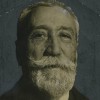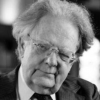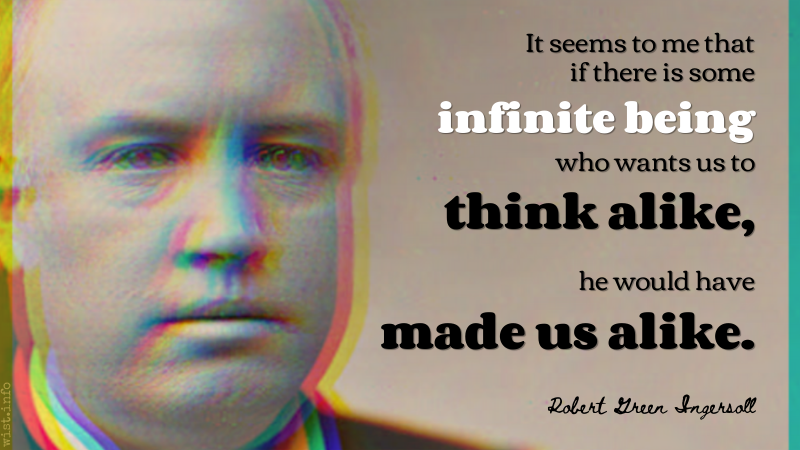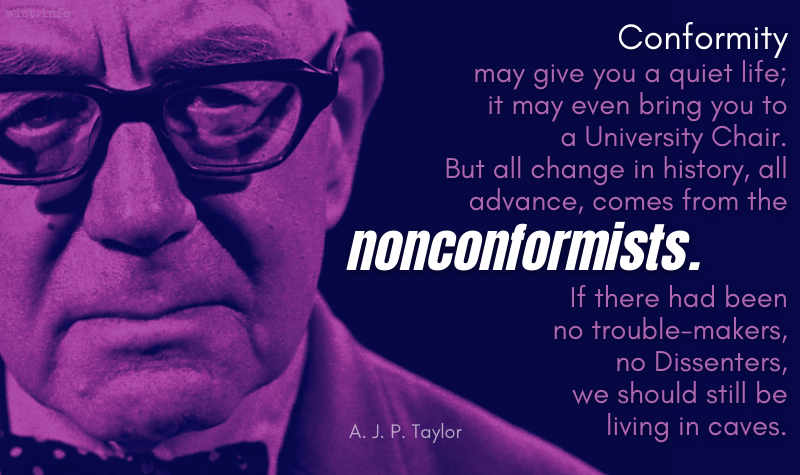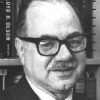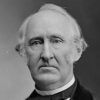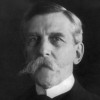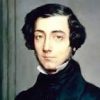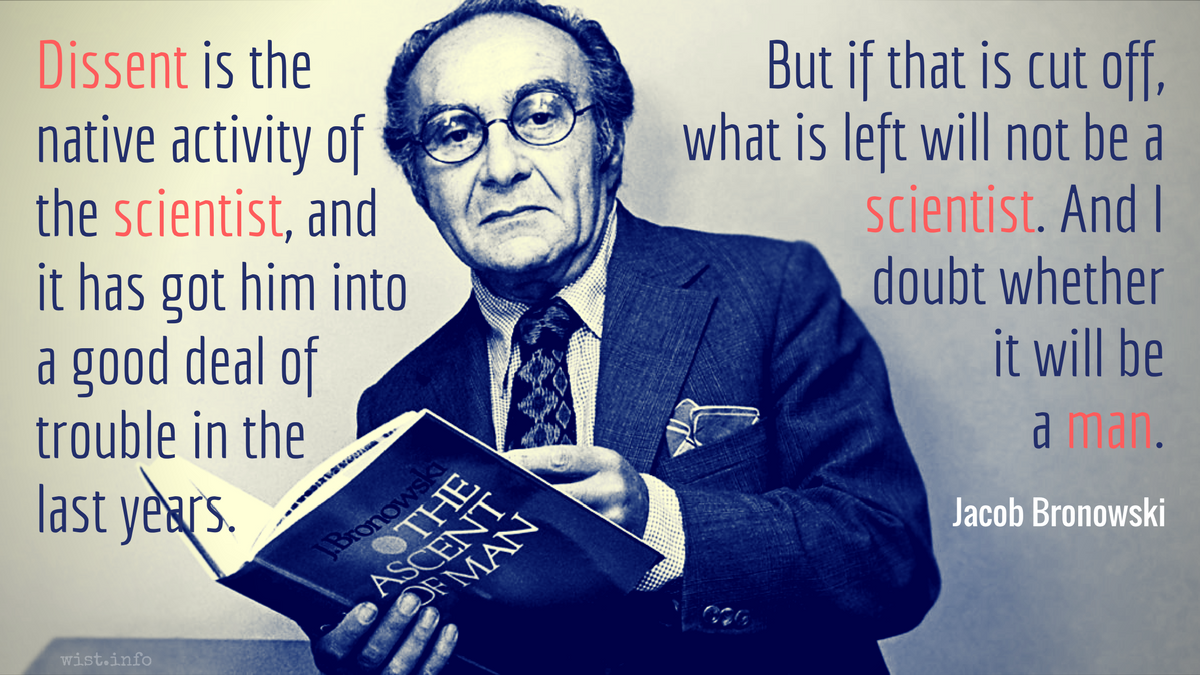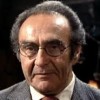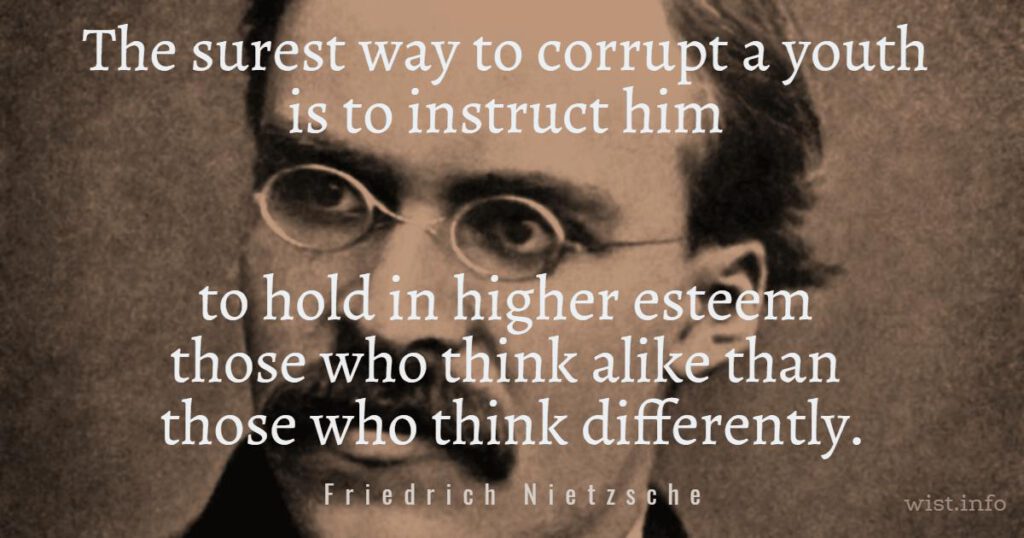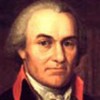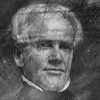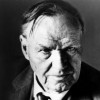Perhaps people with my point of view are in a minority today. But the fact of being in a minority does not, in itself, trouble me, nor do I see anything un-American about being in a minority position. Quite the contrary. The minority views of one day are frequently the majority views of another, and in the possibility of this being so rests all our potentiality for progress.
Jane Jacobs (1916-2006) American-Canadian journalist, author, urban theorist, activist
“No Virtue in Meek Conformity” (1952)
(Source)
Foreword to her response to a State Department Loyalty Security Board interrogatory (1952-03-25). Reprinted in Vital Little Plans (2016).
Quotations about:
dissent
Note not all quotations have been tagged, so Search may find additional quotes on this topic.
It is the certainty that they possess the truth that makes men cruel.
[C’est la certitude qu’ils tiennent la vérité qui rend les hommes cruels.]
Anatole France (1844-1924) French poet, journalist, novelist, Nobel Laureate [pseud. of Jaques-Anatole-François Thibault]
(Misquotation)
Widely attributed (in French and English) to Anatole France, but not found in his works, including the one location it is sometimes cited from, Les Dieux Ont Soif [The Gods Are Thirsty, The Gods Are Athirst, The Gods Will Have Blood] (1912), in either English translation or, more importantly, in the original French.
While thematically keeping in the novel's depiction of the French Revolution and the Terror, the closest match to the quote I can find is this portion of ch. 22, talking about the expediting of the trials of those charged with counter-revolutionary crimes, eliminating the need to prove a misdeed by simply inquiring as to the accused's beliefs.
Justice thus abbreviated satisfied them; the pace was quickened, and no obstacles were left to fret them. They limited themselves to an inquiry into the opinions of the accused, not conceiving it possible that anyone could think differently from themselves except in pure perversity. Believing themselves the exclusive possessors of truth, wisdom, the quintessence of good, they attributed to their opponents noting but error and evil. They felt themselves all-powerful; they envisaged God.
[tr. Allinson (1913), Jackson (1921)]
Justice, thus curtailed, satisfied them; the pace was quickened and no obstacles were left to confuse them. They confined themselves to inquiring into the opinions of the accused, not conceiving it possible that anyone, except from pure perversity, could think differently from themselves. Believing themselves to possess a monopoly of truth, wisdom and goodness, they attributed to their opponents all error, stupidity and evil. They felt themselves omnipotent: their eyes had seen God.
[tr. Davies (1979)]
La justice abrégée les contentait. Rien, dans sa marche accélérée, ne les troublait plus. Ils s’enquéraient seulement des opinions des accusés, ne concevant pas qu’on pût sans méchanceté penser autrement qu’eux. Comme ils croyaient posséder la vérité, la sagesse, le souverain bien, ils attribuaient à leurs adversaires l’erreur et le mal. Ils se sentaient forts : ils voyaient Dieu.
[Original]
When the whole world is running towards a cliff, he who is running in the opposite direction appears to have lost his mind.
Why is it that right-wing bastards always stand shoulder to shoulder in solidarity, while liberals fall out among themselves?
Yevgeny Yevtushenko (1933-2017) Russian poet, writer, film director, academic [Евге́ний Евтуше́нко, Evgenij Evtušenko]
In The Observer (15 Dec 1991)
(Source)
The First Amendment means to me, however, that the only constitutional way our Government can preserve itself is to leave its people the fullest possible freedom to praise, criticize or discuss, as they see fit, all governmental policies and to suggest, if they desire, that even its most fundamental postulates are bad and should be changed.
Hugo Black (1886-1971) American politician and jurist, US Supreme Court Justice (1937-71)
Barenblatt v. United States, 360 U.S. 109, 145-46 (1959) [dissent]
(Source)
Loyalty … is a realization that America was born of revolt, flourished in dissent, became great through experimentation.
But if our democracy is to flourish it must have criticism, if our government is to function it must have dissent. Only totalitarian governments insist upon conformity and they — as we know — do so at their peril. Without criticism abuses will go unrebuked; without dissent our dynamic system will become static. The American people ‘have a stake in the maintenance of the most thorough-going inquisition into American institutions. They have a stake in nonconformity, for they know that the American genius is nonconformist.
We should not forget that our tradition is one of protest and revolt, and it is stultifying to celebrate the rebels of the past — Jefferson and Paine, Emerson and Thoreau — while we silence the rebels of the present.
We do not protect freedom in order to indulge error. We protect freedom in order to discover truth. We do not maintain freedom in order to permit eccentricity to flourish; we maintain freedom in order that society may profit from criticism, even eccentric criticism. We do not encourage dissent for sentimental reasons; we encourage dissent because we cannot live without it.
Henry Steele Commager (1902-1998) American historian, writer, activist
“The Necessity of Freedom,” Freedom, Loyalty, Dissent (1954)
(Source)
An earlier version of the essay was given as "The Pragmatic Necessity for Freedom," Cooper Lecture, Swarthmore College (1951).
There can be no free speech in a mob: free speech is one thing a mob can’t stand.
Northrop Frye (1912-1991) Canadian literary critic and literary theorist
The Educated Imagination, Talk 6 “The Vocation of Eloquence” (1963)
(Source)
The Bill of Rights was not written into the Constitution in order to protect governments from “trouble,” but so that the people might have a legitimate method of causing trouble to governments they no longer trusted.
Henry Steele Commager (1902-1998) American historian, writer, activist
Letter to the Editor, New York Times (17 Jun 1971)
(Source)
The greatest danger that threatens us is neither heterodox thought nor orthodox thought, but the absence of thought.
Henry Steele Commager (1902-1998) American historian, writer, activist
Civil Liberties under Attack (1951)
(Source)
It seems to me that if there is some infinite being who wants us to think alike, he would have made us alike.
Robert Green Ingersoll (1833-1899) American lawyer, agnostic, orator
Speech to the Jury, Trial of C. B. Reynolds for Blasphemy, Morristown, New Jersey (May 1887)
(Source)
Men use up their lives in heart-breaking political struggles, or get themselves killed in civil wars, or tortured in the secret prisons of the Gestapo, not in order to establish some central-heated, air-conditioned, strip-lighted Paradise, but because they want a world in which human beings love one another instead of swindling and murdering one another. And they want that world as a first step. Where they go from there is not so certain, and the attempt to foresee it in detail merely confuses the issue.
George Orwell (1903-1950) English writer [pseud. of Eric Arthur Blair]
“Can Socialists Be Happy?” Tribune (20 Dec 1943) [as John Freeman]
(Source)
Conformity may give you a quiet life; it may even bring you to a University Chair. But all change in history, all advance, comes from the nonconformists. If there had been no trouble-makers, no Dissenters, we should still be living in caves.
People say we ought not to allow ourselves to be drawn into a theoretical antagonism between Nazidom and democracy; but the antagonism is here now. It is this very conflict of spiritual and moral ideas which gives the free countries a great part of their strength. You see these dictators on their pedestals, surrounded by the bayonets of their soldiers and the truncheons of their police. On all sides they are guarded by masses of armed men, cannons, aeroplanes, fortifications, and the like — they boast and vaunt themselves before the world, yet in their hearts there is unspoken fear. They are afraid of words and thoughts; words spoken abroad, thoughts stirring at home — all the more powerful because forbidden — terrify them. A little mouse of thought appears in the room, and even the mightiest potentates are thrown into panic. They make frantic efforts to bar our thoughts and words; they are afraid of the workings of the human mind. Cannons, airplanes, they can manufacture in large quantities; but how are they to quell the natural promptings of human nature, which after all these centuries of trial and progress has inherited a whole armoury of potent and indestructible knowledge?
Winston Churchill (1874-1965) British statesman and author
“The Defence of Freedom and Peace (The Lights are Going Out),” radio broadcast (16 Oct 1938)
(Source)
A society is most vigorous, and appealing, when both partisan and critic are legitimate voices in the permanent dialogue that is the testing of ideas and experience. One can be a critic of one’s country without being an enemy of its promise.
Daniel Bell (1919-2011) American sociologist, writer, editor, academic
The End of Ideology, Introduction (1961 ed.)
(Source)
The time to assert rights is when they are denied; the men to assert them are those to whom they are denied. The community which dares not protect its humblest and most hated member in the free utterance of his opinions, no matter how false or hateful, is only a gang of slaves.
Wendell Phillips (1811-1884) American abolitionist, orator, social activist
“Mobs and Education,” Speech, Twenty-Eighth Congregational Society, Boston (16 Dec 1860)
(Source)
As reported in the Liberator (21 Dec 1860).
Note: There is a synthetic quotation frequently attributed to Phillips that is a actually combination of this one, and these three others:
No matter whose lips that would speak, they must be free and ungagged. The community which dares not protect its humblest and most hated member in the free utterance of his opinions, no matter how false or hateful, is only a gang of slaves. If there is anything in the universe that can’t stand discussion, let it crack.
While Phillips often reused rhetorical elements (as most orators do), this particular combination appears to be combination not actually found in his speeches or writing.
This is an example of what those who have studied history well know: When stupidity is considered patriotism, it is unsafe to be intelligent.
The art of holding onto power is the American system’s special grace. The trick is to make reform seem so tantalizingly close as to dull the edge of militancy and force the purest revolutionaries into the peripheries of political action.
Andrew Kopkind (1935-1994) American journalist
“Are We in the Middle of a Revolution?” New York Times Magazine (10 Nov 1968)
(Source)
Persecution for the expression of opinions seems to me perfectly logical. If you have no doubt of your premises or your power, and want a certain result with all your heart, you naturally express your wishes in law, and sweep away all opposition. To allow opposition by speech seems to indicate that you think the speech impotent, as when a man says that he has squared the circle, or that you do not care wholeheartedly for the result, or that you doubt either your power or your premises.
But when men have realized that time has upset many fighting faiths, they may come to believe even more than they believe the very foundations of their own conduct that the ultimate good desired is better reached by free trade in ideas — that the best test of truth is the power of the thought to get itself accepted in the competition of the market, and that truth is the only ground upon which their wishes safely can be carried out.
That, at any rate, is the theory of our Constitution. It is an experiment, as all life is an experiment. Every year, if not every day, we have to wager our salvation upon some prophecy based upon imperfect knowledge. While that experiment is part of our system, I think that we should be eternally vigilant against attempts to check the expression of opinions that we loathe and believe to be fraught with death, unless they so imminently threaten immediate interference with the lawful and pressing purposes of the law that an immediate check is required to save the country.
Oliver Wendell Holmes, Jr. (1841-1935) American jurist, Supreme Court Justice
Abrams v. United States, 250 U.S. 616 (1919) [dissent]
(Source)
America is therefore a free country, in which, lest anyone be hurt by your remarks, you are not allowed to speak freely of private individuals or of the State; of the citizen or of the authorities; of public or of private undertakings; or, in short, of anything at all, except it be of the climate and the soil; and even then Americans will be found ready to defend either the one or the other, as if they had been contrived by the inhabitants of the country.
Alexis de Tocqueville (1805-1859) French writer, diplomat, politician
Democracy in America, Vol. 1, “Public Spirit in the United States” (1835) [tr. Reeve (1839)]
(Source)
The truth is always in the minority, and the minority is always stronger than the majority, because as a rule the minority is made up of those who actually have an opinion, while the strength of the majority is illusory, formed of that crowd which has no opinion — and which therefore the next moment (when it becomes clear that the minority is the stronger) adopts the latter’s opinion, which now is in the majority, i.e., becomes rubbish by having the whole retinue and numerousness on its side, while the truth is again in a new minority.
Dissent is the native activity of the scientist, and it has got him into a good deal of trouble in the last years. But if that is cut off, what is left will not be a scientist. And I doubt whether it will be a man.
Jacob Bronowski (1908-1974) Polish-English humanist and mathematician
Lecture, MIT (19 Mar 1953)
(Source)
Reprinted as Science and Human Values, Part 3, sec. 5 "The Sense of Human Dignity" (1961).
The surest way to corrupt a youth is to instruct him to hold in higher esteem those who think alike than those who think differently.
Religious discord has lost her sting; the cumbrous weapons of theological warfare are antiquated: the field of politics supplies the alchymists of our times with materials of more fatal explosion, and the butchers of mankind no longer travel to another world for instruments of cruelty and destruction. Our age is too enlightened to contend upon topics, which concern only the interests of eternity; and men who hold in proper contempt all controversies about trifles, except such as inflame their own passions, have made it a common-place censure against your ancestors, that their zeal was enkindled by subjects of trivial importance; and that however aggrieved by the intolerance of others, they were alike intolerant themselves. Against these objections, your candid judgment will not require an unqualified justification; but your respect and gratitude for the founders of the State may boldly claim an ample apology. The original grounds of their separation from the church of England, were not objects of a magnitude to dissolve the bonds of communion; much less those of charity, between Christian brethren of the same essential principles.
Surely there is no better way to stop the rising of new sects and schisms than to reform abuses; to compound the smaller differences; to proceed mildly, and not with sanguinary persecutions; and rather to take off the principal authors by winning and advancing them, than to enrage them by violence and bitterness.
Francis Bacon (1561-1626) English philosopher, scientist, author, statesman
“Of Vicissitude of Things,” Essays, No. 58 (1625)
(Source)
No matter that patriotism is too often the refuge of scoundrels. Dissent, rebellion, and all-around hell-rousing remain the true duty of patriots.
Barbara Ehrenreich (b. 1941) American feminist, journalist, political activist
“Introduction: Family Values” (1988), The Worst Years of Our Lives (1990)
See Johnson.
Some very worthy persons, who have not had great advantages for information, have objected against that clause in the constitution which provides, that no religious test shall ever be required as a qualification to any office or public trust under the United States. They have been afraid that this clause is unfavorable to religion. But my countrymen, the sole purpose and effect of it is to exclude persecution, and to secure to you the important right of religious liberty. We are almost the only people in the world, who have a full enjoyment of this important right of human nature. In our country every man has a right to worship God in that way which is most agreeable to his conscience. If he be a good and peaceable person he is liable to no penalties or incapacities on account of his religious sentiments; or in other words, he is not subject to persecution. But in other parts of the world, it has been, and still is, far different. Systems of religious error have been adopted, in times of ignorance. It has been the interest of tyrannical kings, popes, and prelates, to maintain these errors. When the clouds of ignorance began to vanish, and the people grew more enlightened, there was no other way to keep them in error, but to prohibit their altering their religious opinions by severe persecuting laws. In this way persecution became general throughout Europe.
Oliver Ellsworth (1745-1807) American lawyer, politician, Founder, Supreme Court chief justice (1796-1800)
Essay (17 Dec 1787)
(Source)
The notion that a radical is one who hates his country is naive and usually idiotic. He is, more likely, one who likes his country more than the rest of us, and is thus more disturbed than the rest of us when he sees it debauched. He is not a bad citizen turning to crime; he is a good citizen driven to despair.
H. L. Mencken (1880-1956) American writer and journalist [Henry Lewis Mencken]
“The Coolidge Buncombe” (6 Oct 1924)
(Source)
No man ought to be hindered saying or writing what he pleases on the conduct of those who undertake the management of national affairs, in which all are concerned, and therefore have the right to inquire, and to publish their suspicions concerning them. For if you punish the slanderer, you deter the fair inquirer.
James Burgh (1714-1775) British politician and writer
Political Disquisitions, Book 1 “Of Government, briefly” (1774)
(Source)
MILNE: No matter how imperfect things are, if you’ve got a free press everything is correctable, and without it everything is concealable.
RUTH: I’m with you on the free press. It’s the newspapers I can’t stand.
Without debate, without criticism, no Administration and no country can succeed — and no republic can survive. That is why the Athenian lawmaker Solon decreed it a crime for any citizen to shrink from controversy. And that is why our press was protected by the First Amendment — the only business in America specifically protected by the Constitution — not primarily to amuse and entertain, not to emphasize the trivial and the sentimental, not to simply “give the public what it wants” — but to inform, to arouse, to reflect, to state our dangers and our opportunities, to indicate our crises and our choices, to lead, mold, educate and sometimes even anger public opinion.
John F. Kennedy (1917-1963) US President (1961-63)
Speech, American Newspaper Publishers Association (27 Apr 1961)
(Source)
I may stand alone,
But would not change my free thoughts for a throne.
If government, or those in positions of power and authority, can silence criticism by the argument that such criticism might be misunderstood somewhere, there is an end to all criticism, and perhaps an end to our kind of political system. For men in authority will always think that criticism of their policies is dangerous. They will always equate their policies with patriotism, and find criticism subversive.
Henry Steele Commager (1902-1998) American historian, writer, activist
“The Problem of Dissent” Saturday Review (Dec 1965)
(Source)
Reprinted in Freedom and Order (1966); also read into the US Congressional Record (26 Jun 1969).
We believe very strongly on preserving the right to differ in this country, and the right to dissent; and if I have done a good job of anything since I’ve been president, it’s to ensure that there are plenty of dissenters.
Lyndon B. Johnson (1908-1973) American politician, educator, US President (1963-69)
Press Conference (1967-11-17)
(Source)
Video:
Do not think of knocking out another person’s brains because he differs in opinion from you. It would be as rational to knock yourself on the head because you differ from yourself ten years ago.
You measure democracy by the freedom it gives its dissidents, not the freedom it gives its assimilated conformists.
Abbie Hoffman (1936-1989) American political activist
In Benny Avni, “An Interview with Abbie Hoffman” (1986), Tikkun (Jul-Aug 1989)
(Source)
Nothing is cheaper and more common than physical bravery. […] Common experience shows how much rarer is moral courage than physical bravery. A thousand men will march to the mouth of the cannon where one man will dare espouse an unpopular cause […] True courage and manhood come from the consciousness of the right attitude toward the world, the faith in one’s own purpose, and the sufficiency of one’s own approval as a justification for one’s own acts.
Moral cowardice that keeps us from speaking our minds is as dangerous to this country as irresponsible talk. The right way is not always the popular and easy way. Standing for right when it is unpopular is a true test of moral character.
Struggles to coerce uniformity of sentiment in support of some end thought essential to their time and country have been waged by many good, as well as by evil, men. Nationalism is a relatively recent phenomenon, but, at other times and places, the ends have been racial or territorial security, support of a dynasty or regime, and particular plans for saving souls. As first and moderate methods to attain unity have failed, those bent on its accomplishment must resort to an ever-increasing severity. […] Those who begin coercive elimination of dissent soon find themselves exterminating dissenters. Compulsory unification of opinion achieves only the unanimity of the graveyard.
Robert H. Jackson (1892-1954) US Supreme Court Justice (1941-54), lawyer, jurist, politician
West Virginia Board of Education v. Barnette, 318-319 U.S. 624 (1943) [majority opinion]
(Source)
I believe that that community is already in process of dissolution where each man begins to eye his neighbor as a possible enemy, where non-conformity with the accepted creed, political as well as religious, is a mark of disaffection; where denunciation, without specification or backing, takes the place of evidence; where orthodoxy chokes freedom of dissent; where faith in the eventual supremacy of reason has become so timid that we are not enter our convictions into the open list, to win or lose. Such fears as these are a solvent which can eat out the cement that binds the stones together; they may in the end subject us to a despotism as evil as any that we dread; and they can be allayed only in so far as we refuse to proceed on suspicion, and trust one another until we have tangible ground for misgiving,
Learned Hand (1872-1961) American jurist
“A Plea for the Open Mind and Free Discussion,” speech, University of the State of New York, Albany (1952-10-24)
(Source)
Risk for risk, for myself I had rather take my chance that some traitors will escape detection than spread abroad a spirit of general suspicion and distrust, which accepts rumor and gossip in place of undismayed and unintimidated inquiry.
Learned Hand (1872-1961) American jurist
“A Plea for the Open Mind and Free Discussion,” speech, University of the State of New York, Albany (1952-10-24)
(Source)
Those of us who shout the loudest about Americanism in making character assassinations are all too frequently those who, by our own words and acts, ignore some of the basic principles of Americanism:
The right to criticize.
The right to hold unpopular beliefs.
The right to protest.
The right of independent thought.The exercise of these rights should not cost one single American citizen his reputation or his right to a livelihood, nor should he be in danger of losing his reputation or livelihood merely because he happens to know someone who holds unpopular beliefs. Who of us doesn’t? Otherwise none of us could call our souls our own. Otherwise thought control would have set in.
Margaret Chase Smith (1897-1965) American politician (US Senator, Maine)
“Declaration of Conscience” (1950-06-01)
(Source)
Speech given in the US Senate.
First as to Speech. That privilege rests upon the premise that there is no proposition so uniformly acknowledged that it may not be lawfully challenged, questioned, and debated. It need not rest upon the further premise that there are no propositions that are not open to doubt; it is enough, even if there are, that in the end it is worse to suppress dissent than to run the risk of heresy.
Learned Hand (1872-1961) American jurist
“The Guardians,” Oliver Wendell Holmes Lecture #3, Harvard University (1958)
(Source)
Speaking of the First Amendment to the US Constitution.


